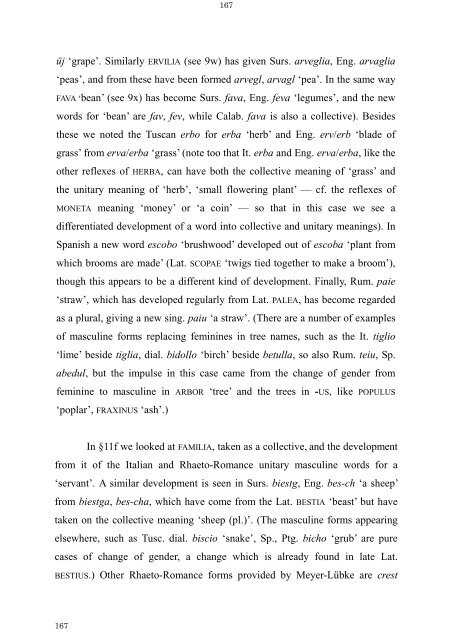The Latin Neuter Plurals in Romance - Page ON
The Latin Neuter Plurals in Romance - Page ON
The Latin Neuter Plurals in Romance - Page ON
You also want an ePaper? Increase the reach of your titles
YUMPU automatically turns print PDFs into web optimized ePapers that Google loves.
167<br />
167<br />
üj ‘grape’. Similarly ERVILIA (see 9w) has given Surs. arveglia, Eng. arvaglia<br />
‘peas’, and from these have been formed arvegl, arvagl ‘pea’. In the same way<br />
FAVA ‘bean’ (see 9x) has become Surs. fava, Eng. feva ‘legumes’, and the new<br />
words for ‘bean’ are fav, fev, while Calab. fava is also a collective). Besides<br />
these we noted the Tuscan erbo for erba ‘herb’ and Eng. erv/erb ‘blade of<br />
grass’ from erva/erba ‘grass’ (note too that It. erba and Eng. erva/erba, like the<br />
other reflexes of HERBA, can have both the collective mean<strong>in</strong>g of ‘grass’ and<br />
the unitary mean<strong>in</strong>g of ‘herb’, ‘small flower<strong>in</strong>g plant’ — cf. the reflexes of<br />
M<strong>ON</strong>ETA mean<strong>in</strong>g ‘money’ or ‘a co<strong>in</strong>’ — so that <strong>in</strong> this case we see a<br />
differentiated development of a word <strong>in</strong>to collective and unitary mean<strong>in</strong>gs). In<br />
Spanish a new word escobo ‘brushwood’ developed out of escoba ‘plant from<br />
which brooms are made’ (Lat. SCOPAE ‘twigs tied together to make a broom’),<br />
though this appears to be a different k<strong>in</strong>d of development. F<strong>in</strong>ally, Rum. paie<br />
‘straw’, which has developed regularly from Lat. PALEA, has become regarded<br />
as a plural, giv<strong>in</strong>g a new s<strong>in</strong>g. paiu ‘a straw’. (<strong>The</strong>re are a number of examples<br />
of mascul<strong>in</strong>e forms replac<strong>in</strong>g fem<strong>in</strong><strong>in</strong>es <strong>in</strong> tree names, such as the It. tiglio<br />
‘lime’ beside tiglia, dial. bidollo ‘birch’ beside betulla, so also Rum. teiu, Sp.<br />
abedul, but the impulse <strong>in</strong> this case came from the change of gender from<br />
fem<strong>in</strong><strong>in</strong>e to mascul<strong>in</strong>e <strong>in</strong> ARBOR ‘tree’ and the trees <strong>in</strong> -US, like POPULUS<br />
‘poplar’, FRAXINUS ‘ash’.)<br />
In §11f we looked at FAMILIA, taken as a collective, and the development<br />
from it of the Italian and Rhaeto-<strong>Romance</strong> unitary mascul<strong>in</strong>e words for a<br />
‘servant’. A similar development is seen <strong>in</strong> Surs. biestg, Eng. bes-ch ‘a sheep’<br />
from biestga, bes-cha, which have come from the Lat. BESTIA ‘beast’ but have<br />
taken on the collective mean<strong>in</strong>g ‘sheep (pl.)’. (<strong>The</strong> mascul<strong>in</strong>e forms appear<strong>in</strong>g<br />
elsewhere, such as Tusc. dial. biscio ‘snake’, Sp., Ptg. bicho ‘grub’ are pure<br />
cases of change of gender, a change which is already found <strong>in</strong> late Lat.<br />
BESTIUS.) Other Rhaeto-<strong>Romance</strong> forms provided by Meyer-Lübke are crest









